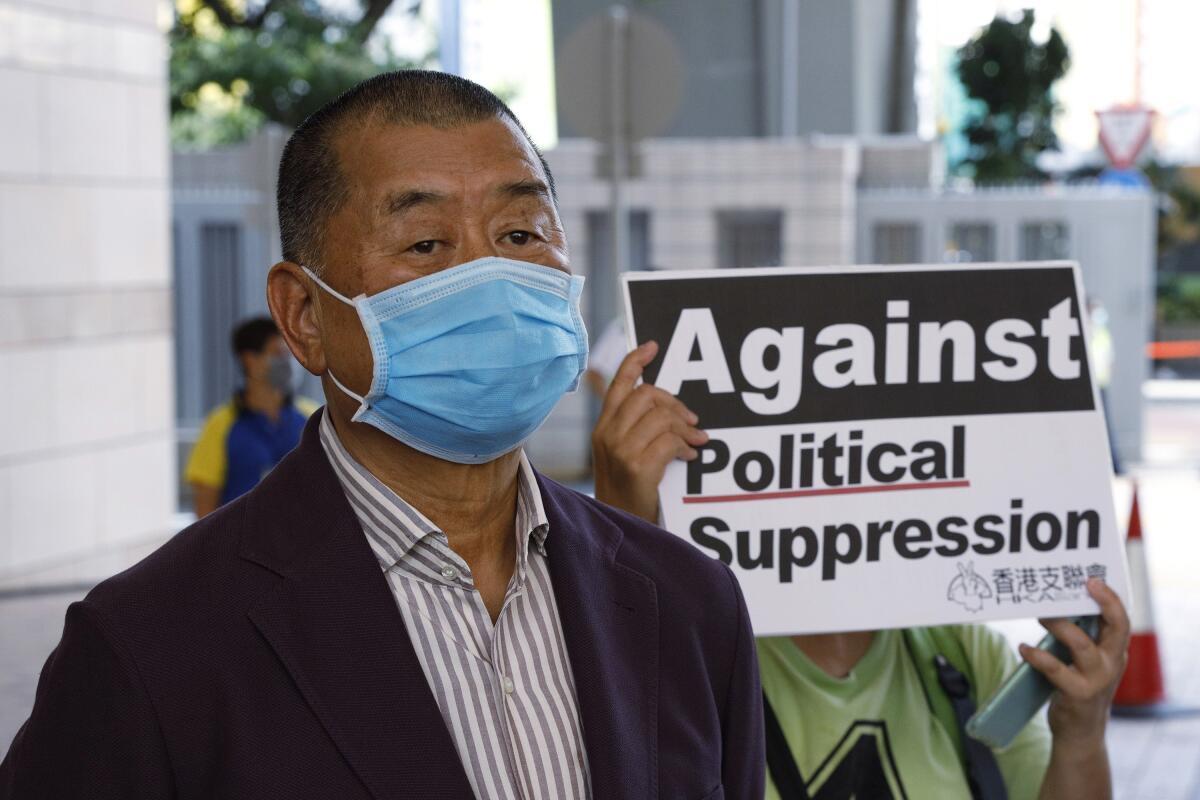Hong Kong pro-democracy publisher may face life in prison under security law

- Share via
HONG KONG — Jimmy Lai broke into Hong Kong’s rambunctious media world 30 years ago armed with the belief that delivering information equates with protecting freedom.
Lai’s own freedom is at stake as he fights charges of endangering national security as former publisher of his now-defunct pro-democracy newspaper Apple Daily.
Already serving a 20-month term after being convicted on other charges, Lai, 74, could face up to life in prison if he is convicted under a National Security Law that Beijing has imposed, silencing or jailing many pro-democracy activists.
The high-profile trial set to begin Thursday has also sparked controversy over whether Lai’s British lawyer will be allowed to defend him. Hong Kong’s pro-Beijing leader, John Lee, has asked China to issue a ruling that could block the veteran barrister, Timothy Owen, from representing Lai.
If Beijing intervenes, it would mark the sixth time the Communist Party-ruled government has stepped in despite its promise to respect Hong Kong’s judicial independence and civil liberties for at least 50 years after China took over the British colony in 1997.
The Hong Kong Department of Justice has asked for the trial, which will be overseen by three judges, to be suspended pending a decision from Beijing about Lai’s defense lawyer.
Lai’s legal troubles derailed a stunning career for a man smuggled into Hong Kong from the Chinese mainland at age 12.
After getting only a primary school education, he started out working in a glove factory and sprinted up the ranks to found the casual-clothing chain Giordano in 1981. After the crackdown on 1989 student-led pro-democracy protests centered in Beijing’s Tiananmen Square, he became an outspoken advocate for democracy, founding Next Magazine the year after.
Attacks on Giordano by the Chinese government prompted Lai to sell his shares in the business and devote himself to the media world.
In 1995, Lai launched Apple Daily, which quickly became one of the city’s top-selling newspapers with its coverage of politics and celebrities.
The publication survived a newspaper price war and expanded into Taiwan in the 2000s.
Apple Daily pioneered the use of animated videos online to accompany news reports. Its scoops and critical reports on the government attracted a strong following. Apple Daily also adopted a strong pro-democracy stance.
Lai participated in protests in Hong Kong in 2019, meeting with then-U.S. Vice President Mike Pence and Secretary of State Michael R. Pompeo to discuss since-withdrawn legislation that would have allowed criminal suspects to be extradited to mainland China.
Opposition to the bill transformed into months of sometimes violent protests as demands for greater democracy in Hong Kong escalated. The protest movement, which eventually was snuffed out, lacked any clear leader, but Lai’s high profile made him a target of the authorities.
Apple Daily denounced the enactment of the National Security Law in June 2020. Lai told the Associated Press that “Hong Kong is dead,” but said he would stay.
“If I leave, not only do I disgrace myself, I’d discredit Apple Daily, I’d undermine the solidarity of the democratic movement,” he said.
In August that year, Lai was arrested on suspicion of colluding with foreign forces. More than 200 police officers raided the offices of Next Digital, Apple Daily’s parent company.
Arrests of its top executives, editors and journalists and the freezing of $2.3-million worth of assets forced the newspaper to shut down in June 2021. It sold a million copies of its final edition.
In recent hearings, Lai has appeared tanned, possibly due to outdoor time in Stanley Prison — the city’s largest maximum-security lockup — and in good spirits. People who have been in touch with him have noted that he is turning to his Roman Catholic faith in prison, along with a friend who wished to remain anonymous due to the issue’s sensitivity, saying Lai drew the figure of Jesus on the cross in the letters he sent to others.
Lai is charged with two counts of conspiracy to collude with foreign forces and one charge of collusion under the National Security Law. His trial is Hong Kong’s first to center on allegations of collusion with foreign forces. Lai also was charged with sedition under a colonial-era law that has been used to quash dissent.
Next month, Lai is due to be sentenced for alleged fraud related to subletting office space to a company he also controlled.
In an interview in July 2020, Lai seemed unfazed.
“If I have to go to prison, I don’t mind. I don’t care,” he said.
“I cannot worry, because you never know what kind of measures they will take against me.”
More to Read
Sign up for Essential California
The most important California stories and recommendations in your inbox every morning.
You may occasionally receive promotional content from the Los Angeles Times.













